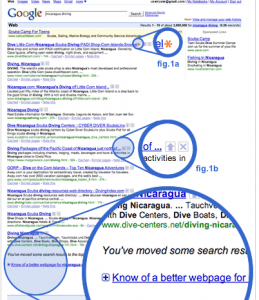About two days ago, an interesting article from Alex Citu pointed me out on a new Google Chrome extension that allows people to “block” a domain name from the Search Results List.
Unfortunately, as the author said, it’s not tied to a web service and the blacklist is not saved to your Google account, so this means that you could not use it on a different computer or another browser. So what’s the point to use this extension, in particular considering that data can come from a browser whose usage is not well settled in the market (about 15% in Europe)?
Well the reason is pretty simple. As Matt Cutts said the extension does a little more: while hiding the domains you’ve blocked, the list is sent to Google for further analysis. This will allow Cutt’s team to study the feedbacks and explore using them as a potential ranking signal for the search results.
Does this mean that only the 15% of the European user may contribute to improve the effectiveness of the results invalidating the SEO effort?
It sounds really weird for me, especially considering that some times ago – march 2008 – using Google labs it was possible to enable a new and interesting feature.
 This was called the “like it” button, and essentially was doing the same that the Chrome extension can do today, so “submitting” a preference to the search engine and seeing a particular result go up or down the SERP.
This was called the “like it” button, and essentially was doing the same that the Chrome extension can do today, so “submitting” a preference to the search engine and seeing a particular result go up or down the SERP.
I appreciate the “like it” button was slightly different, but if you think about it you can find a lot of similarities. However, the best part of the labs experiment was it’s accessibility, therefore everybody in the world with every browser would have been able to enable it and submit their preferences.
And guess what? Even if not publicly declared, even those data was transmitted to the search engine for further elaborations.
So what’s the point to have this new chrome extension?
Is this demonstrating once more the weaknesses of the Sylicon Valley search engine?
Is SPAM really becoming a serious problem to which Google is not able to cope with?
Micheal Arrington made a very interesting article in which complains about the quality of the Google Results and highlight on its fails.
To me this looks like the same story that has happened many years ago with Altavista, which 10 years ago was dominating the industry and today has gone (it has been absorbed by Overturture, so by Yahoo!).
Does this really mean we need to look after a new search engine?
Maybe! It’s difficult to nake any predictions at this stage, but everything can happen. Stay tuned for more info.

